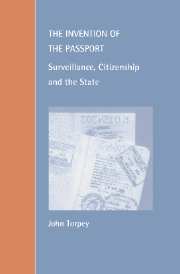Crossref Citations
This Book has been
cited by the following publications. This list is generated based on data provided by Crossref.
Kertzer, David I.
and
Arel, Dominique
2001.
Census and Identity.
p.
1.
Greenberg, Joshua
and
Hier, Sean
2001.
Crisis, Mobilization and Collective Problematization: "illegal" Chinese migrants and the Canadian news media.
Journalism Studies,
Vol. 2,
Issue. 4,
p.
563.
Lyon, David
2002.
Everyday Surveillance: Personal data and social classifications.
Information, Communication & Society,
Vol. 5,
Issue. 2,
p.
242.
Walters, William
2002.
Mapping Schengenland: Denaturalizing the Border.
Environment and Planning D: Society and Space,
Vol. 20,
Issue. 5,
p.
561.
Walters, William
2002.
Deportation, Expulsion, and the International Police of Aliens.
Citizenship Studies,
Vol. 6,
Issue. 3,
p.
265.
Lucassen, Leo
2002.
Administrative into social control: The aliens police and foreign female servants in the Netherlands, 1918-40.
Social History,
Vol. 27,
Issue. 3,
p.
327.
Muller, Benjamin J.
2004.
(Dis)qualified bodies: securitization, citizenship and ‘identity management’.
Citizenship Studies,
Vol. 8,
Issue. 3,
p.
279.
Brubaker, Rogers
2004.
Ethnicity, Nationalism, and Minority Rights.
p.
50.
Jackson, Steven
2004.
Review Essay: Surveying Surveillance Studies.
Canadian Journal of Communication,
Vol. 29,
Issue. 2,
p.
213.
Loveman, Mara
2005.
The Modern State and the Primitive Accumulation of Symbolic Power.
American Journal of Sociology,
Vol. 110,
Issue. 6,
p.
1651.
Zolberg, Aristide R.
2006.
Managing a World on the Move.
Population and Development Review,
Vol. 32,
Issue. S1,
p.
222.
Löwenheim, Oded
2007.
The Responsibility to Responsibilize: Foreign Offices and the Issuing of Travel Warnings.
International Political Sociology,
Vol. 1,
Issue. 3,
p.
203.
Tyrrell, Ian
2007.
Transnational Nation.
p.
118.
Blitz, Brad K.
2007.
Decentralisation, Citizenship and Mobility: Residency Restrictions and Skilled Migration in Moscow.
Citizenship Studies,
Vol. 11,
Issue. 4,
p.
383.
Morieux, Renaud
2008.
Une mer pour deux royaumes.
p.
359.
Henry, Matthew
2008.
Border geostrategies: Imagining and administering New Zealand's post‐World War One borders.
New Zealand Geographer,
Vol. 64,
Issue. 3,
p.
194.
Reicher, Stephen
Haslam, S. Alexander
and
Rath, Rakshi
2008.
Making a Virtue of Evil: A Five‐Step Social Identity Model of the Development of Collective Hate.
Social and Personality Psychology Compass,
Vol. 2,
Issue. 3,
p.
1313.
SATO, Shigeki
2009.
Nation-State and Immigrant Integration.
Japanese Sociological Review,
Vol. 60,
Issue. 3,
p.
348.
ROBERTSON, CRAIG
2009.
Four Documents, a Non‐Citizen, and a Diplomatic Controversy: The Documentation of Identity in the Mid‐Nineteenth Century.
Journal of Historical Sociology,
Vol. 22,
Issue. 4,
p.
476.
Reinecke, Christiane
2009.
Riskante Wanderungen.
Geschichte und Gesellschaft,
Vol. 35,
Issue. 1,
p.
64.





